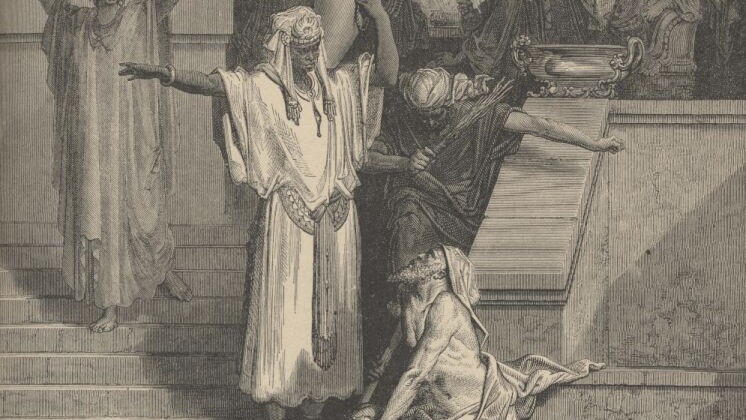
ver hear someone appeal to “personal property” rights in the context of disputing social justice? If I had a nickel. Turns out, the Church Fathers, Doctors, and saints saw it otherwise.
Bow down thy ear cheerfully to the poor, and pay what thou owest. (Sirach 4:8).
Son, remember that thou in thy lifetime receivedst thy good things, and likewise Lazarus evil things: but now he is comforted, and thou art tormented. (Luke 16:25)
Behold, the wages of the laborers who mowed your fields, which you kept back by fraud, cry out; and the cries of the harvesters have reached the ears of the Lord of hosts. (James 5:4)
The earth belongs to everyone, not to the rich, but there are fewer who do not use what is theirs than who do use it. You are giving back something that is owed. (St. Ambrose, On Naboth 12.53)
Not to enable the poor to share in our goods is to steal from them and deprive them of life. The goods we possess are not ours, but theirs. (St. John Chrysostom, quoted by CCC 2446)
Vainly, then, do those suppose themselves innocent, who claim to their own private use the common gift of God; those who, in not imparting what they have received, walk in the midst of the slaughter of their neighbours; since they almost daily slay so many persons as there are dying poor whose subsidies they keep close in their own possession. For, when we administer necessaries of any kind to the indigent, we do not bestow our own, but render them what is theirs; we rather pay a debt of justice than accomplish works of mercy. (St. Gregory the Great, Pastoral Rule III.21)
It is no less a crime to take from him that has, than to refuse to succor the needy when you can and are well off. (St. Ambrose, quoted by Aquinas in Summa Theologica)
Whatever certain people have in superabundance is due, by natural law, to the purpose of succoring the poor. (St. Thomas Aquinas, Summa Theologica)
A man ought to possess external things, not as his own, but as common, so that, to wit, he is ready to communicate them to others in their need. (St. Thomas Aquinas, Summa Theologica)
God intended the earth with everything contained in it for the use of all human beings and peoples. Thus, under the leadership of justice and in the company of charity, created goods should be in abundance for all in like manner. Whatever the forms of property may be, as adapted to the legitimate institutions of peoples, according to diverse and changeable circumstances, attention must always be paid to this universal destination of earthly goods. In using them, therefore, man should regard the external things that he legitimately possesses not only as his own but also as common in the sense that they should be able to benefit not only him but also others. (Gaudium et Spes 69)
The right to private property is not absolute and unconditional. No one may appropriate surplus goods solely for his own private use when others lack the bare necessities of life. (Pope Paul VI, Populorum Progressio 23)
But it will be necessary above all to abandon a mentality in which the poor — as individuals and as peoples — are considered a burden, as irksome intruders trying to consume what others have produced. The poor ask for the right to share in enjoying material goods and to make good use of their capacity for work, thus creating a world that is more just and prosperous for all. The advancement of the poor constitutes a great opportunity for the moral, cultural and even economic growth of all humanity. (Pope St. John Paul II, Centesimus Annus 28)
•••
Our service to the poor is not “charity”; it is what we owe them in justice. The Church has long told us that anything else is theft. She has long told us that private property is not an absolute right.
Listen to all Church teaching. Listen even to the hard parts.
Discover more from To Give a Defense
Subscribe to get the latest posts sent to your email.